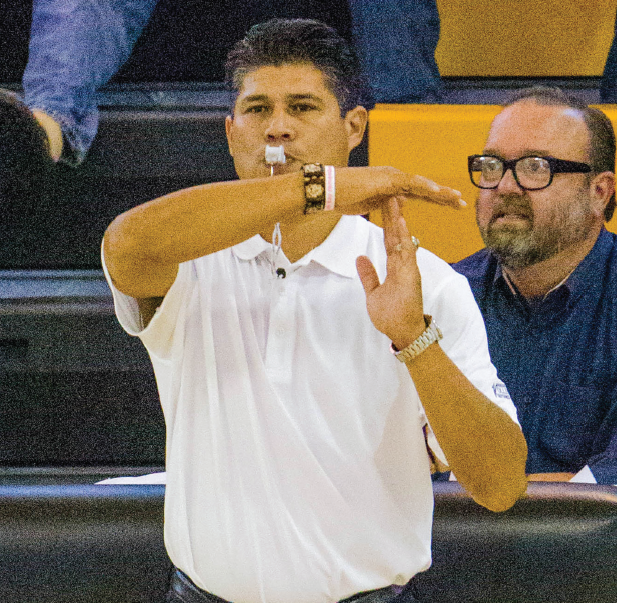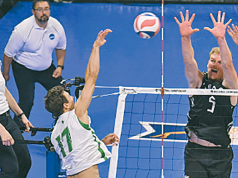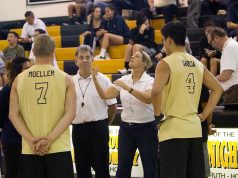As we prepare for each season, we study rules and interpretations, casebooks and officiating manuals, and attend preseason clinics and meetings. And once the season starts, we usually have a list of goals that we try to accomplish. For many referees, especially those who are gaining experience, the goal list probably includes something like ballhandling consistency, overlaps/alignments or back-row awareness. But what about the veteran referees who have mastered those skills? What are they working on?
Professionalism
It should go without saying that our veterans place professionalism at the top of their priority list. They have hundreds of matches under their belts. They’ve worked with dozens and dozens of different partners and encountered hundreds or even thousands of different coaches over the years. They’ve seen great examples of professionalism and some not so great. They know what it means to be professional, and they make that a goal each time they step onto the court. Ethics, integrity, reliability and responsibility are characteristics they possess.
Communication skills
Interpersonal communication skills are a key focal point for veteran referees. It’s a constant work in progress, evaluating body language, eye contact, facial expressions and hand gestures, not to mention verbal skills. Each coach and each partner has different ways of communicating. It’s situational. The words we used with one coach on a given night won’t work in the same way with a different coach, or even the same coach, on a different night. We work with a variety of partners and line judges who have myriad personalities and communication styles. The best communicators can work with anyone and can get the officiating crew to perform at its best. Veteran referees will help create a cohesive officiating team by using their communication skills.
Teamwork
Teamwork goes hand-in- hand with communication skills. The better we work with our partner, the line judges and the scoring crew, the more successful we will be, individually and as a team. Veterans — the leaders on the officiating crew — know that by helping everyone on the crew, the value of the crew’s work increases. They help others to succeed on the officiating team by encouraging them, engaging them and supporting them. A chain is only as strong as its weakest link, and our top referees help to strengthen each link in the chain.
Signals and mechanics
Veteran referees strive to be sharp and accurate with their signals and mechanics. When a mechanic changes, they’re quick to adapt and implement the new procedure. Those who officiate under multiple rules codes transition between rules codes as seamlessly as possible, following the prescribed techniques for each. They understand the importance of consistency among the officiating cadre when it comes to mechanics, signals and techniques.
Tempo
Maintaining a consistent match tempo is a trait of veteran referees. The cadence and timing of their signal sequence is smooth regardless of the call they’re making. They have a scanning pattern before and after each rally, and the time between rallies seldom varies. As the intensity of the match increases, an experienced referee will stay calm and focused by relying on his or her established tempo. The teams will rely on that tempo as well. Veterans understand momentum and match flow, and they will contribute to the match by maintaining a smooth flow.
Court awareness
A mantra for many veteran referees is “be aware of everything that happens on your court, from warmups until the match is over.” That means they are keenly aware of the playing area and everything that happens on and around the court. Having that awareness allows the referees to react and respond to situations with increased knowledge. Their goal is to always be able to answer the question, “Hey, did you see (insert situation) happen on your court?” Whether it’s a spectator, media personnel, an errant practice ball, a player injury, or a random distraction, a veteran’s goal is to identify the situation quickly and then handle it appropriately. They never want their response to be, “No, I didn’t notice that,” or “I didn’t see that.”
Visual focus
Veteran referees know when, where and how to momentarily take their eyes off the ball to look ahead to the next playing action. They know that certain playing actions may have a particular result, and that allows them to be focused in the right area at the right time to view the play. It requires anticipation and alertness, and they constantly fine-tune their visual focus skills in order to be in the best position to make decisions.
And yes, in addition to all of those things, veteran referees are still working on their ballhandling, overlaps/alignments, back-row awareness, and every other aspect of their game. They aren’t resting on their laurels when it comes to the rules, and they stay abreast of changes in the sport. Players’ skill levels are ever-increasing. Our seasoned referees don’t want to become stagnant or maintain the status quo. They want to excel on the court, and they want to contribute positively to the participants’ experience. They’ve learned how to juggle all of those different facets of the game so that they’re better, even if it’s only just a little bit better, every time they head to the court.
If you’re not already one of our veterans, you will be some day. Until then, learn from the veterans you work with. Watch what they do. Mimic the good things that they do and be ready to step into your role as one of our seasoned veterans.
What's Your Call? Leave a Comment:
Note: This article is archival in nature. Rules, interpretations, mechanics, philosophies and other information may or may not be correct for the current year.
This article is the copyright of ©Referee Enterprises, Inc., and may not be republished in whole or in part online, in print or in any capacity without expressed written permission from Referee. The article is made available for educational use by individuals.


















